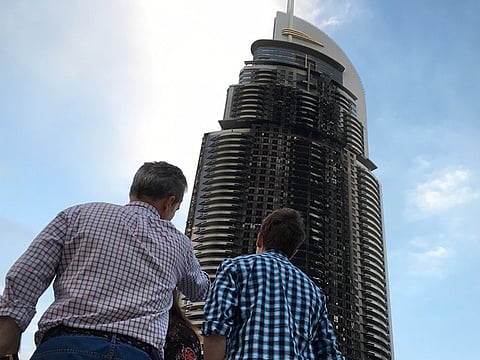New Year Eve’s fire probe nears completion
Blackened Downtown Dubai landmark remains sealed off from the public until further notice

Dubai: Municipal officials are nearing the end of a comprehensive probe into the New Year’s Eve fire at the Address Downtown Hotel.
Investigation has been underway since Dubai firefighters waged a 13-hour battle to knock down a dramatic wall of flames that scorched 40 floors of the facade of the 63-storey hotel.
The blackened Downtown Dubai landmark remains sealed off from the public until further notice.
The investigation is expected to be finalised within the week, confirmed a senior municipal official on Tuesday.
In an interview, Marwan Al Mohammed, Director of the Public Health and Safety Department at Dubai Municipality, said that a nine-member Emergency and Crisis Committee – including representatives from Dubai Police and Dubai Civil Defence – is conducting the review.
Investigators are still sifting through the charred debris left in wake of an aggressive blaze that broke out on the 20th floor of the five-star hotel, which includes 600 apartments.
As many as 700 workers were assigned for the clean-up in the aftermath.
“The fire caused the most damage to the building’s cladding, as its interior structure remained mostly untouched. Our report of the investigation will assess the damage, and with the presence of the building’s owner, police and firefighters, we are sweeping through the hotel floor-by-floor to evaluate the damage,” said Al Mohammad.
“There are still traces of smoke on some floors, and once the Civil Defence gives us the go-ahead, we will visit them,” said Al Mohammad.
He pointed out that the Emergency and Crisis Committee’s investigation includes a full inventory on the state of the physical elements of the structure including wiring, pipes and support structures to determine the extent of restoration needed to reopen the Address Downtown Hotel.
He ruled out demolition as a possible option, given that the hotel only opened in September 2009 and is relatively young compared to aging structures in older quarters of the city. And with relatively minor damage to the interior of the building, the structure appears to be sound.
“But the Address Hotel is new, so it will not come down to that, unlike the [Al Shamsi] building in Deira that had to be demolished because it was almost 40 years old,” he said.
Part of the review by officials will be aided by building and fire code standards in Dubai and across the UAE such as the UAE Fire and Life Safety Code.
Following high-profile fires in Sharjah and in Dubai in 2012, annexures to the UAE Fire and Life Safety Code in November 2012 clearly defined new rules that banned non fire-rated panels from high rise towers under construction over 15 metres tall.
“All cladding panels shall be tested and approved for combustibility and flame spread classification at the maximum thickness intended for use and intended assemblies and shall not contain foamed plastic insulation at its core,” stated the revisions to the code in 2012, adding that “non rated material is not permitted unless recommended by panel manufacturers”.
The safety code update stated that cladding and other associated materials “shall be tested as an assembly and shall be certified as capable of preventing the spread of heat, fire, toxic gases, smoke or other defined hazards”.
In addition, to guard against black bitumen sealant on the concrete surface below the panels from acting as a further accelerant, the amendments dictate that “any cladding panels installed shall be completely separated from the building interior by a thermal barrier”.



